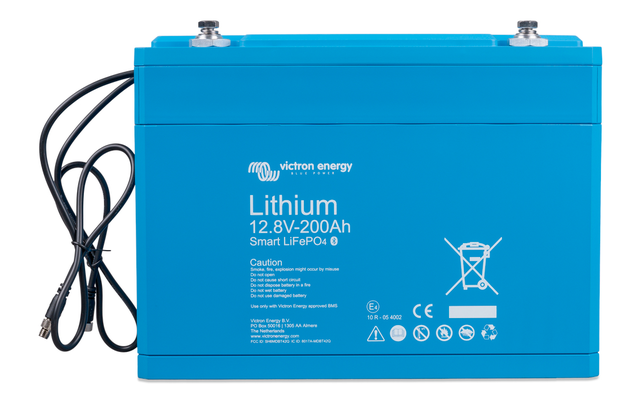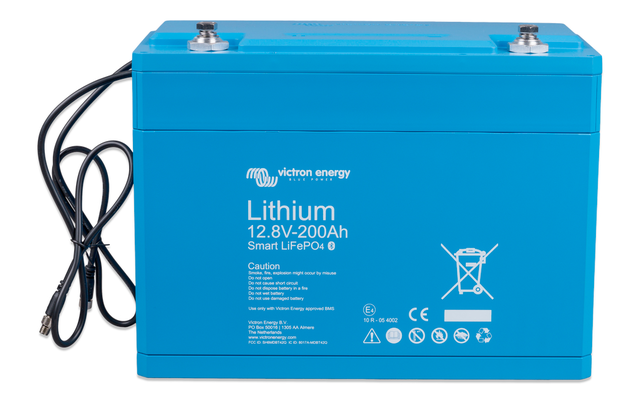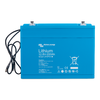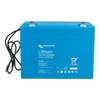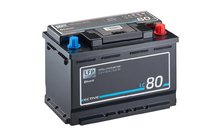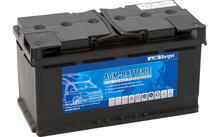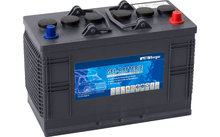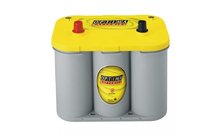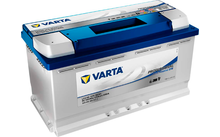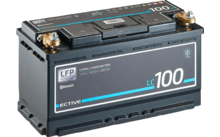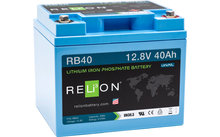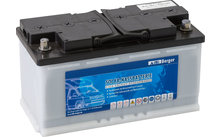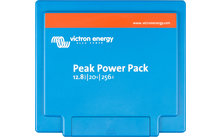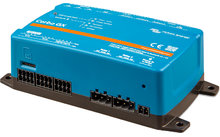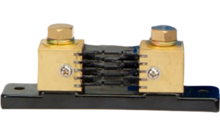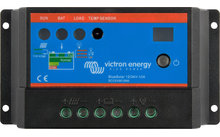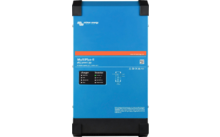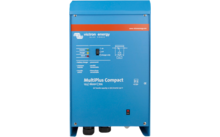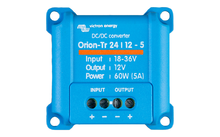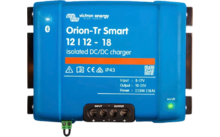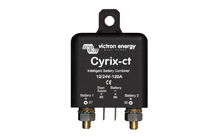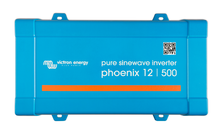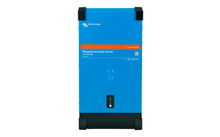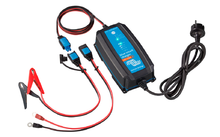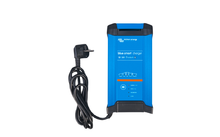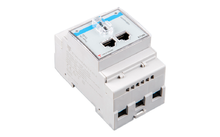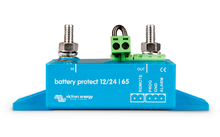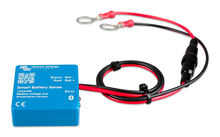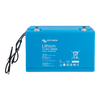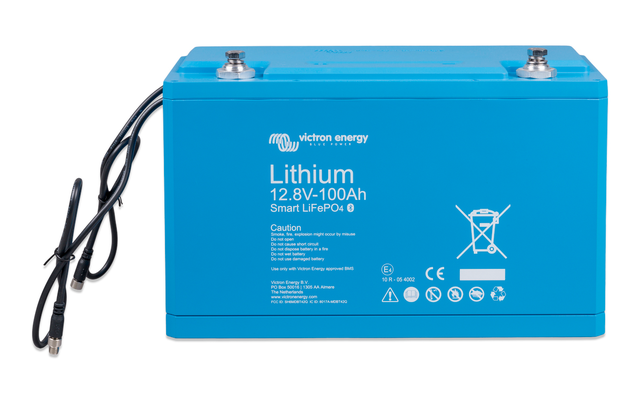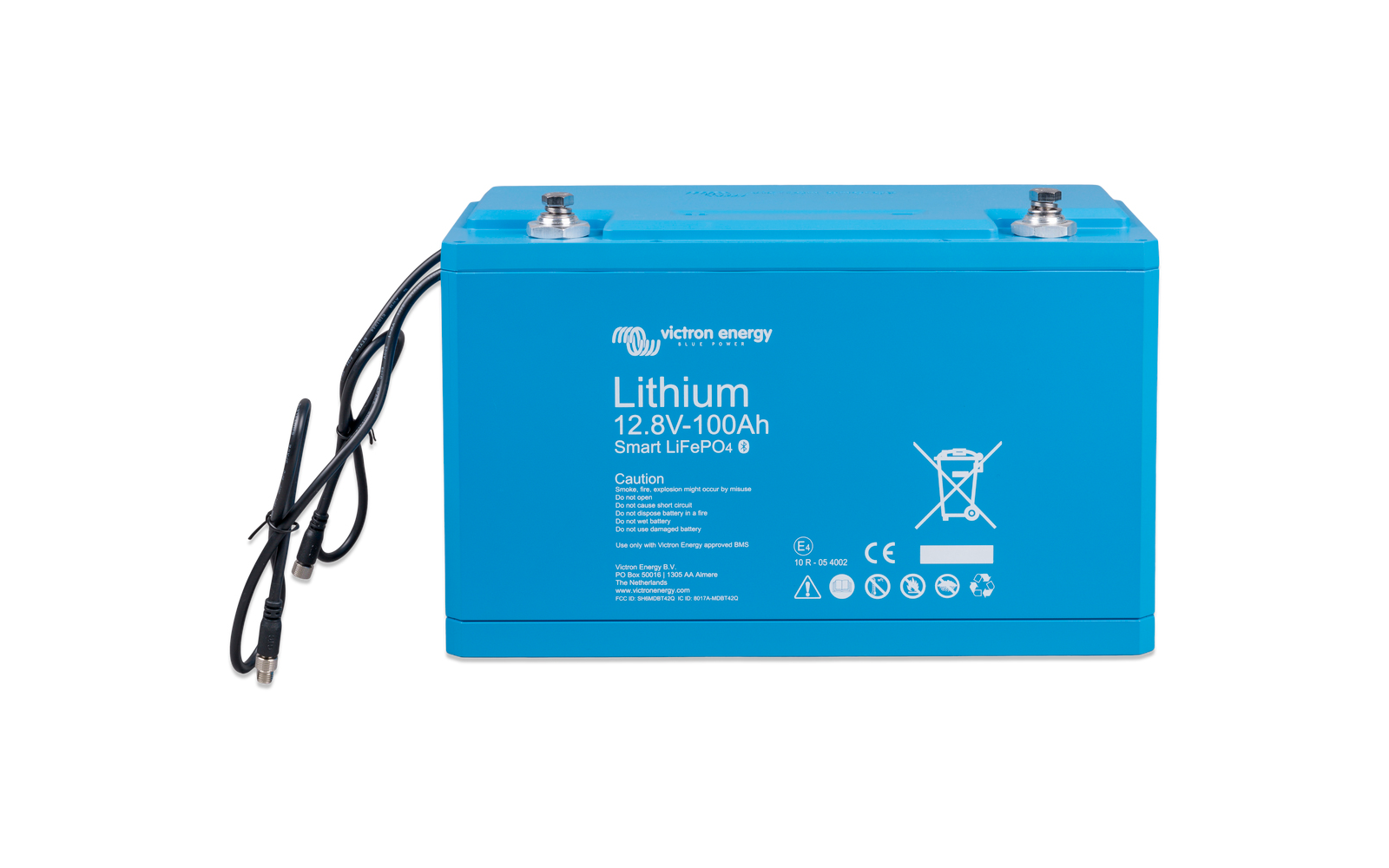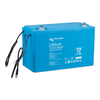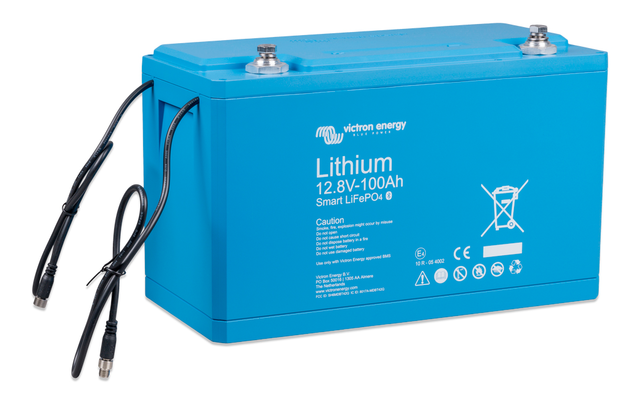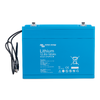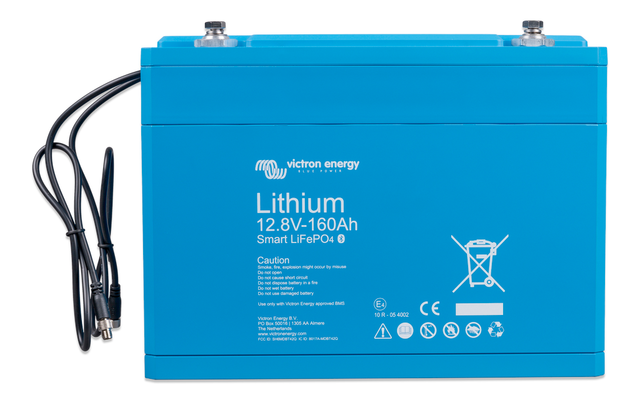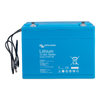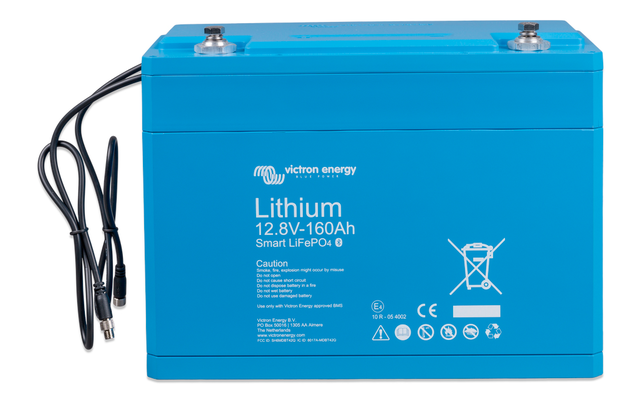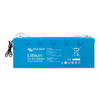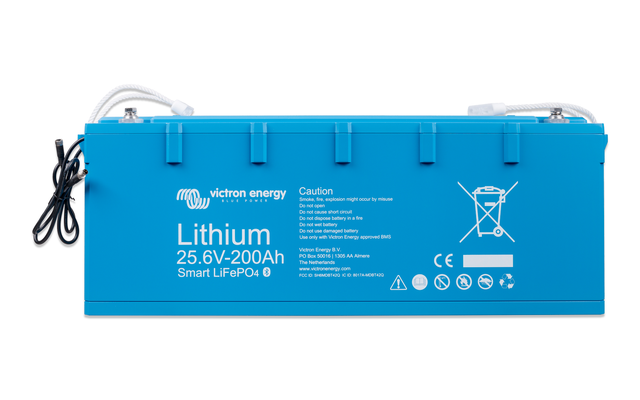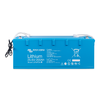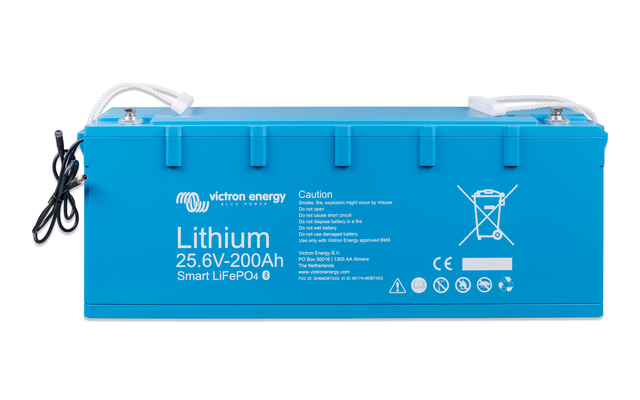Victron Energy LFP Smart 12.8 / 100 lithium battery 12.8 V 100 AhVictron Energy LFP Smart 12.8 / 160 lithium battery 12.8 V 160 AhVictron Energy LFP Smart 12.8 / 200 Lithium battery 12.8 V 200 AhVictron Energy LFP Smart 25.6 / 200-a lithium battery 25.6 V 200 Ah
Product details
| Bluetooth app available for monitoring cell voltage and temperature | Can be connected in parallel and in series |
| With integrated cell balancing | Robust and efficient |
Product description
Robust
A lead-acid battery will fail prematurely due to sulfation in the following cases:
When it is operated for a long time in an insufficiently charged condition (i.e., when the battery is rarely or never fully charged).
If left in a partially charged or, even worse, fully discharged state (yacht or motorhome during winter).
An LFP battery does not need to be fully charged. In fact, operating life increases slightly if the battery is only partially charged instead of fully charged. This is a significant advantage of LFP batteries compared to lead-acid batteries.
Other advantages include a wide operating temperature range, excellent cycling, low internal resistance and high efficiency (see below).
LFP is therefore the chemistry of choice for demanding applications.
Efficient
For numerous applications (especially off-grid solar and/or wind), energy efficiency can be of critical importance.
The round-trip energy efficiency (discharged from 100% to 0% and charged back to 100%) of an average lead-acid battery is 80%.
The round-trip energy efficiency of an LFP battery is 92 %.
The charging process of a lead-acid battery becomes predominantly inefficient when the 80% state of charge mark has been reached. This leads to energy utilization rates of only 50 %. For solar systems, this value is even lower, as there are energy reserves for several
Days are needed (the battery is operating in a state of charge between 70% and 100%).
An LFP battery, on the other hand, still achieves an energy utilization rate of 90% even when it is in a shallow discharge state.
Size and weight
Space savings of up to 70
Weight savings of up to 70
Bluetooth
Cell voltages, temperature and alarm status can be monitored via Bluetooth.
This is very useful to detect a (possible) problem like cell imbalance.
Features
| Type battery | Battery (Other) |
| Batterie Bauart | Lithium / LiFePO4 battery |
| Weight | 14 kg |
| Capacity | 100 Ah |
| Dimensions (LxWxH) | 152 x 321 x 197 mm |
| 12 V | 12,8 |
| ean | 8719076043041 |
| Manufacturer Article No. | BAT512110610 |
Features
| Type battery | Battery (Other) |
| Batterie Bauart | Lithium / LiFePO4 battery |
| Weight | 18 kg |
| Capacity | 160 Ah |
| Dimensions (LxWxH) | 152 x 321 x 237 mm |
| 12 V | 12,8 |
| ean | 8719076048930 |
| Manufacturer Article No. | BAT512116610 |
Features
| Type battery | Battery (Other) |
| Batterie Bauart | Lithium / LiFePO4 battery |
| Weight | 20 kg |
| Capacity | 200 Ah |
| Dimensions (LxWxH) | 152 x 321 x 237 mm |
| 12 V | 12,8 |
| ean | 8719076045526 |
| Manufacturer Article No. | BAT512120610 |
Features
| Type battery | Battery (Other) |
| Batterie Bauart | Lithium / LiFePO4 battery |
| Weight | 39 kg |
| Capacity | 200 Ah |
| Dimensions (LxWxH) | 163 x 650 x 237 mm |
| 24 V | 25,6 |
| ean | 8719076054610 |
| Manufacturer Article No. | BAT524120610 |
Legal information
Manufacturer information
Accusysteme TransWatt GmbH
Am Tiggemann 4
59505 Bad Sassendorf
Germany
matyschik@transwatt.de
Legal information
Manufacturer information
Accusysteme TransWatt GmbH
Am Tiggemann 4
59505 Bad Sassendorf
Germany
matyschik@transwatt.de
Legal information
Manufacturer information
Accusysteme TransWatt GmbH
Am Tiggemann 4
59505 Bad Sassendorf
Germany
matyschik@transwatt.de
Legal information
Manufacturer information
Accusysteme TransWatt GmbH
Am Tiggemann 4
59505 Bad Sassendorf
Germany
matyschik@transwatt.de
Note
Please note: since our deliveries may contain batteries (single-use and rechargeable),
according to the German Law on Batteries (BattG) we must advise you of the following:
single-use and rechargeable batteries must not be disposed of along with domestic waste, but rather you are legally required to return used batteries. Used batteries may contain damaging substances which, if not stored or disposed of appropriately, may damage the environment or your health. Batteries may, however, also contain important raw materials, such as, for example, iron, zion, magnesium or nickel, which can be recycled. Once used, you may either send the batteries back to us, or return them in
your vicinity (e.g. at the shop, communal recycling points or at our expedition warehouse) - free of charge. When returning used batteries to points of sale, the quantity you are allowed to return is limited to the quantity typical for a single end user, and to those batteries which the seller offers or used to offer in their product range.

The symbol with a rubbish bin crossed out means that you must not dispose of single-use and rechargeable batteries
along with the domestic waste. Underneath this symbol you will also find the following symbols which have the following
meanings:
Li: battery contains lithium
Return address:
Fritz Berger GmbH
Fritz-Berger-Str. 1
D - 92318 Neumarkt
Note
Please note: since our deliveries may contain batteries (single-use and rechargeable),
according to the German Law on Batteries (BattG) we must advise you of the following:
single-use and rechargeable batteries must not be disposed of along with domestic waste, but rather you are legally required to return used batteries. Used batteries may contain damaging substances which, if not stored or disposed of appropriately, may damage the environment or your health. Batteries may, however, also contain important raw materials, such as, for example, iron, zion, magnesium or nickel, which can be recycled. Once used, you may either send the batteries back to us, or return them in
your vicinity (e.g. at the shop, communal recycling points or at our expedition warehouse) - free of charge. When returning used batteries to points of sale, the quantity you are allowed to return is limited to the quantity typical for a single end user, and to those batteries which the seller offers or used to offer in their product range.

The symbol with a rubbish bin crossed out means that you must not dispose of single-use and rechargeable batteries
along with the domestic waste. Underneath this symbol you will also find the following symbols which have the following
meanings:
Li: battery contains lithium
Return address:
Fritz Berger GmbH
Fritz-Berger-Str. 1
D - 92318 Neumarkt
Note
Please note: since our deliveries may contain batteries (single-use and rechargeable),
according to the German Law on Batteries (BattG) we must advise you of the following:
single-use and rechargeable batteries must not be disposed of along with domestic waste, but rather you are legally required to return used batteries. Used batteries may contain damaging substances which, if not stored or disposed of appropriately, may damage the environment or your health. Batteries may, however, also contain important raw materials, such as, for example, iron, zion, magnesium or nickel, which can be recycled. Once used, you may either send the batteries back to us, or return them in
your vicinity (e.g. at the shop, communal recycling points or at our expedition warehouse) - free of charge. When returning used batteries to points of sale, the quantity you are allowed to return is limited to the quantity typical for a single end user, and to those batteries which the seller offers or used to offer in their product range.

The symbol with a rubbish bin crossed out means that you must not dispose of single-use and rechargeable batteries
along with the domestic waste. Underneath this symbol you will also find the following symbols which have the following
meanings:
Li: battery contains lithium
Return address:
Fritz Berger GmbH
Fritz-Berger-Str. 1
D - 92318 Neumarkt
Note
Please note: since our deliveries may contain batteries (single-use and rechargeable),
according to the German Law on Batteries (BattG) we must advise you of the following:
single-use and rechargeable batteries must not be disposed of along with domestic waste, but rather you are legally required to return used batteries. Used batteries may contain damaging substances which, if not stored or disposed of appropriately, may damage the environment or your health. Batteries may, however, also contain important raw materials, such as, for example, iron, zion, magnesium or nickel, which can be recycled. Once used, you may either send the batteries back to us, or return them in
your vicinity (e.g. at the shop, communal recycling points or at our expedition warehouse) - free of charge. When returning used batteries to points of sale, the quantity you are allowed to return is limited to the quantity typical for a single end user, and to those batteries which the seller offers or used to offer in their product range.

The symbol with a rubbish bin crossed out means that you must not dispose of single-use and rechargeable batteries
along with the domestic waste. Underneath this symbol you will also find the following symbols which have the following
meanings:
Li: battery contains lithium
Return address:
Fritz Berger GmbH
Fritz-Berger-Str. 1
D - 92318 Neumarkt
- Similar items
- More from this brand































